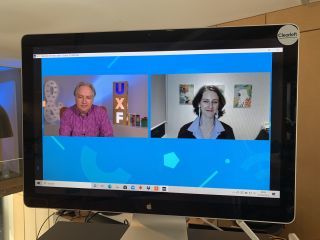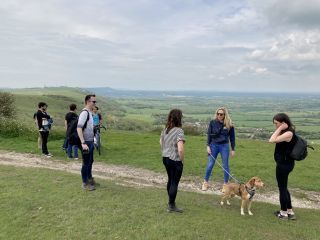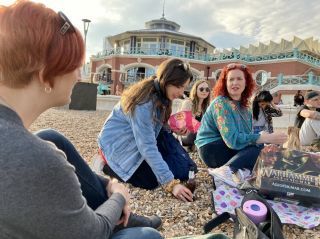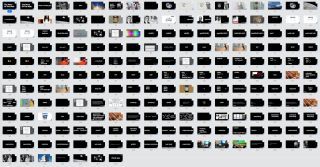Jeremy Keith's Blog, page 43
May 31, 2021
Summertime in England
On Thursday of last week, Summer arrived in England. I accept full responsibility for this. That morning I left the house early and wore a winter coat. So of course the day was filled with glorious sunshine.
I was up early to head into the Clearleft studio to do a tech check and some pre-records for the upcoming UX Fest. We���ve turned a meeting room into a very swanky-looking recording studio with proper lights, mics, and camera. I���ll be hosting UX Fest, channeling my inner Alan Partridge and Ron Burgundy.
Being back in the studio was nice. Some of my Clearleft colleagues joined the agency during The Situation so this was my first chance to meet some of them face to face (or facemask to facemask at least).
The next day I had even more opportunity to see my co-workers without the barriers of computer screens. We had a workplace walk in the countryside to mark one year of becoming an employee-owned agency. We rendezvoused at Devil���s Dyke and walked a bit of the Sussex countryside, just enough to work up an appetite and a thirst to be satiated at the nearby Shepherd and Dog pub in Fulking (near the brilliantly named Fulking Hill). We sat at tables outside, had pints of ale, and a proper pub lunch, chatting all the while, just like in The Before Times.
When I got back to Brighton I met up with Jessica for a beer in the sun before wandered down to the beach together to meet our friend Kate and celebrate her birthday.
Two days of good weather was a blessing, but it didn���t stop there. The next day, Saturday, was even sunnier. We spent the day working in the garden. We planted salads in our raised beds and then fortified those raised beds to make them impenatrable to the family of foxes living in our neighbourbood. Don���t get me wrong, the fox cubs are very cute. I just don���t want them digging up our salads.
On Sunday, Jessica and I sauntered up the hill to Brighton Racecourse so we could cheer on Jake as he finished his hundred kilometre walk from London to Brighton. Normally this would be a very strange behaviour, but it was all for a good cause.
After that, we had a pub lunch (outdoors, of course) before heading home. I spent the rest of the day sitting out in the garden, admiring the handiwork of the previous day, reading and occasionally dozing.
Today it���s more of the same. Glorious sunshine. Sitting in the garden. Reading. Playing some tunes on the mandolin. Looking forward to grilling outside for the third evening in a row.
It feels like something is changing and it���s not just the weather. The Situation, while far from ending, is certainly morphing. I still don���t plan on spending any time indoors, but with weather this good, I don���t need to.
In two weeks time I���ll get my second jab of vaccine. Two weeks after that I can start letting my guard down a bit more. Until then, I���ll be staying outdoors. If the weather continues like this, that won���t be a hardship.
May 23, 2021
Speaking about sci-fi
I���m going to be speaking at the Beyond Tellerrand ���Stay Curious��� event on June 16th. But I���m not going to be talking about anything (directly) web-related…
The topic for the evening is science fiction. There���ll be a talk from me, a talk from Steph, and then a discussion, which I���m really looking forward to.
I got together with Steph last week, which was really fun���we could���ve talked for hours! We compared notes and figured out a way to divvy up the speaking slots. Steph is going to do a deep dive into one specific subgenre of sci-fi. So to set the scene, I���m going to give a broad but shallow overview of the history of sci-fi. To keep things managable, I���m only going to be talking about sci-fi literature (although we can get into films, TV, and anything else in the discussion afterwards).
But I don���t want to just regurgitate facts like a Wikipedia article. I���ve decided that the only honest thing to do is give my own personal history with sci-fi. Instead of trying to give an objective history, I���m going to tell a personal story …even if that means being more open and vulnerable.
I think I���ve got the arc of the story I want to tell. I���ve been putting slides together and I���m quite excited now. I���ve realised I���ve got quite a lot to say. But I don���t want the presentation to get too long. I want to keep it short and snappy so that there���s plenty of time for the discussion afterwards. That���s going to be the best part!
That���s where you come in. The discussion will be driven by the questions and chat from the attendees. Tickets are available on a pay-what-you-want basis, with a minimum price of just ���10. It���ll be an evening event, starting at 6:30pm UK time, 7:30pm in central Europe. So if you���re in the States, that���ll be your morning or afternoon.
Come along if you have any interest in sci-fi. If you have no interest in sci-fi, then please come along���we can have a good discusison about it.
May 15, 2021
The cage
I subscribe to Peter Gasston���s newsletter, The Tech Landscape. It���s good. Peter���s a smart guy with his finger on the pulse of many technologies that are beyond my ken. I recommend subscribing.
But I was very taken aback by what he wrote in issue 202. It was to do with algorithmic recommendation engines.
This week I want to take a little dump on a tweet I read. I���m not going to link to it (I���m not that person), but it basically said something like: ���I���m afraid to Google something because I don���t want the algorithm to think I like it, and I���m afraid to click a link because I don���t want the algorithm to show me more like it��� what a cage.���
I saw the same tweet. It resonated with me. I had responded with a link to a post I wrote a while back called Get safe. That post made two points:
GET requests shouldn���t have side effects. Adding to a dossier on someone���s browsing habits definitely counts as a side effect.It is literally a fundamental principle of the web platform that it should be safe to visit a web page.But Peter describes ubiquitous surveillance as a feature, not a bug:
It���s observing what someone likes or does, then trying to make recommendations for more things like it���whether that���s books, TV shows, clothes, advertising, or whatever. It works on probability, so it���s going to make better guesses the more it knows you; if you like ten things of type A, then liking one thing of type B shouldn���t be enough to completely change its recommendations. The problem is, we don���t like ���the algorithm��� if it doesn���t work, and we don���t like it if works too well (���creepy!���). But it���s not sinister, and it���s not a cage.
He would be correct if the balance of power were tipped towards the person actively looking for recommendations. As I said in my earlier post:
Don���t get me wrong: building a profile of someone based on their actions isn���t inherently wrong. If a user taps on ���like��� or ���favourite��� or ���bookmark���, they are actively telling the server to perform an update (and so those actions should be POST requests). But do you see the difference in where the power lies?
When Peter says ���it���s not sinister, and it���s not a cage��� that may be true for him, but that is not a shared feeling, as the original tweet demonstrates. I don���t think it���s fair to dismiss someone else���s psychological pain because you don���t think they ���get it���. I���m pretty sure everyone ���gets��� how recommendation engines are supposed to work. That���s not the issue. Trying to provide relevant content isn���t the problem. It���s the unbelievably heavy-handed methods that make it feel like a cage.
Peter uses the metaphor of a record shop:
���The algorithm��� is the best way to navigate a world of infinite choice; imagine you went to a record shop (remember them?) which had every recording ever released; how would you find new music? You���d either buy music by bands you know you already liked, or you���d take a pure gamble on something���which most of the time would be a miss. So you���d ask a store worker, and they���d recommend the music they liked���but that���s no guarantee you���d like it. A good worker would ask what type of music you like, and recommend music based on that���you might not like all the recommendations, but there���s more of a chance you���d like some. That���s just what ���the algorithm��� does.
But that���s not true. You don���t ask ���the algorithm��� for a recommendation���it foists them on you whether you want them or not. A more apt metaphor would be that you walked by a record shop once and the store worker came out and followed you down the street, into your home, and watched your every move for the rest of your life.
What Peter describes sounds great���a helpful knowledgable software agent that you ask for recommendations. But that���s not what ���the algorithm��� is. And that���s why it feels like a cage. That���s why it is a cage.
The original tweet was an open, honest, and vulnerable insight into what online recommendation engines feel like. That���s a valuable insight that should be taken on board, not dismissed.
And what a lack of imagination to look at an existing broken system���that doesn���t even provide good recommendations while making people afraid to click on links���and shrug and say that this is the best we can do. If this really is ���is the best way to navigate a world of infinite choice��� then it���s no wonder that people feel like they need to go on a digital detox and get away from their devices in order to feel normal. It���s like saying that decapitation is the best way of solving headaches.
Imagine living in a surveillance state like East Germany, and saying ���Well, how else is the government supposed to make informed decisions without constantly monitoring its citizens?��� I think it���s more likely that you���d feel like you���re in a cage.
Apples to oranges? Kind of. But whether it���s surveillance communism or surveillance capitalism, there���s a shared methodology at work. They���re both systems that disempower people for the supposedly greater good of amassing data. Both are built on the false premise that problems can be solved by getting more and more data. If that results in collateral damage to people���s privacy and mental health, well …it���s all for the greater good, right?
It���s fucking bullshit. I don���t want to live in that cage and I don���t want anyone else to have to live in it either. I���m going to do everything I can to tear it down.
May 13, 2021
Hosting UX Fest
I quite enjoy interviewing people. I don���t mean job interviews. I mean, like, talk show interviews. I���ve had a lot of fun over the years moderating panel discussions: @media Ajax in 2007, SxSW in 2008, Mobilism in 2011, the Progressive Web App Dev Summit and EnhanceConf in 2016.
I���ve even got transcripts of some panels I���ve moderated:
@media 2007 Hot Topics PanelBuilding Portable Social Networks at SxSW 2008,@media 2010 Hot Topics Panel,Mobilism 2011 Mobile Browser Panel,@media 2011 Hot Topics Panel.I enjoyed each and every one. I also had the pleasure of interviewing the speakers at every Responsive Day Out. Hosting events like that is a blast, but what with The Situation and all, there hasn���t been much opportunity for hosting conferences.
Well, I���m going to be hosting an event next month: UX Fest. It���s this year���s online version of UX London.
An online celebration of digital design, taking place throughout June 2021.
I am simultaneously excited and nervous. I���m excited because I���ll have the chance to interview a whole bunch of really smart people. I���m nervous because it���s all happening online and that might feel quite different to an in-person discussion.
But I have an advantage. While the interviews will be live, the preceding talks will be pre-recorded. That means I have to time watch and rewatch each talk, spot connections between them, and think about thought-provoking questions for each speaker.
So that���s what I���m doing between now and the beginning of June. If you���d like to bear witness to the final results, I encourage you to get a ticket for UX Fest. You can come to the three-day conference in the first week of June, or you can get a ticket for the festival spread out over the following three Thursdays in June, or you can get a combo ticket for both and save some money.
There���s an inclusion programme for the conference and festival days:
Anyone from an underrepresented group is invited to apply. We especially invite and welcome Black, indigenous & people of colour, LGBTQIA+ people and people with disabilities.
Here���s the application form.
There���ll also be a whole bunch of hands-on masterclasses throughout June that you can book individually. I won���t be hosting those though. I���ll have plenty to keep me occupied hosting the conference and the festival.
I hope you���ll join me along with Krystal Higgins, David Dylan Thomas, Catt Small, Scott Kubie, Temi Adeniyi, Teresa Torres, Tobias Ahlin and many more wonderful speakers���it���s going to fun!
May 11, 2021
Work at Clearleft
A little while back, I wrote about how much I like the job description of a design engineer. I still have issues with the ���engineer��� part, but overall it���s a great way to describe a front-end developer who works on the front of the front end: the outputs that end users interact with: HTML, CSS, and JavaScript. If it���s delivered in a web browser, then it���s design engineering.
Perhaps you also prefer the front of the front end to the back of the front end. Perhaps you also like to spend your time thinking about resilience, performance, and accessibility rather than build pipelines and frameworks. Perhaps you���d like to work with like-minded people.
Clearleft is hiring a midweight design engineer. Perhaps it���s you.
If you���d like to use your development talents in the service of good design, you should apply. And remember, you���d be working for yourself: Clearleft is an employee-owned agency.
You don���t have to be based in Brighton. You can work remotely, although we���re expecting that a monthly face-to-face gathering will become the norm after The Situation ends. So if you���re based somewhere like London, that would work out nicely. That said, if you���re based somewhere like London, this might also be the ideal opportunity to make a move to the seaside.
You do have to be eligible to work in the UK. Alas, that pool has shrunk somewhat. Thanks, Brexit.
Perhaps you think you���re not qualified. Apply anyway. You���ve got nothing to lose.
Perhaps this role isn���t for you, but you know someone who might fit the bill. Please tell them. Spread the word.
We���d especially love to hear from people under-represented in design and technology.
May 10, 2021
More talk
The Clearleft podcast is currently between seasons, but that���s not going to stop me from yapping on in audio files at any opportunity.
By the way, if you missed any of season two of the Clearleft podcast, be sure to check it out���there���s some good stuff in there.
I���ve been continuing my audio narration of Jay Hoffman���s excellent Web History series over on CSS tricks. We���re eight chapters in already! That���s a good few hours of audio���each chapter is over half an hour long.
The latest chapter was a joy to narrate. It���s all about the history of CSS so I remember many of the events that are mentioned, like when Tantek saved the web by implenting doctype switching (seriously, I honestly believe that if that hadn���t happened, CSS wouldn���t have ���won���). Eric is in there. And Molly. And Elika. And Chris. And Dave.
Here���s the audio file if you want to have a listen. Or you can subscribe to the RSS feed in your podcast-playing app of choice.
If you���re not completely sick of hearing my voice, you can also listen to the latest episode of the Object Oriented UX podcast with Sophia V. Prater. Our chat starts about eleven minutes into the episode and goes on for a good hour.
It was nice to be on the other side of the microphone, so to speak. The topic was Resilient Web Design but the conversation went in all sorts of directions.
I do enjoy a good natter. If you���ve got a podcast and you fancy having a chat, let me know.
April 21, 2021
Get the FLoC out
I���ve always liked the way that web browsers are called ���user agents��� in the world of web standards. It���s such a succinct summation of what browsers are for, or more accurately who browsers are for. Users.
The term makes sense when you consider that the internet is for end users. That���s not to be taken for granted. This assertion is now enshrined in the Internet Engineering Task Force���s RFC 8890���like Magna Carta for the network age. It���s also a great example of prioritisation in a design principle:
When there is a conflict between the interests of end users of the Internet and other parties, IETF decisions should favor end users.
So when a web browser���ostensibly an agent for the user���prioritises user-hostile third parties, we get upset.
Google Chrome���ostensibly an agent for the user���is running an origin trial for Federated Learning of Cohorts (FLoC). This is not a technology that serves the end user. It is a technology that serves third parties who want to target end users. The most common use case is behavioural advertising, but targetting could be applied for more nefarious purposes.
The Electronic Frontier Foundation wrote an explainer last month: Google Is Testing Its Controversial New Ad Targeting Tech in Millions of Browsers. Here���s What We Know.
Let���s back up a minute and look at why this is happening. End users are routinely targeted today (for behavioural advertising and other use cases) through third-party cookies. Some user agents like Apple���s Safari and Mozilla���s Firefox are stamping down on this, disabling third party cookies by default.
Seeing which way the wind is blowing, Google���s Chrome browser will also disable third-party cookies at some time in the future (they���re waiting to shut that barn door until the fire is good���n���raging). But Google isn���t just in the browser business. Google is also in the ad tech business. So they still want to advertisers to be able to target end users.
Yes, this is quite the cognitive dissonance: one part of the business is building a user agent while a different part of the company is working on ways of tracking end users. It���s almost as if one company shouldn���t simultaneously be the market leader in three separate industries: search, advertising, and web browsing. (Seriously though, I honestly think Google���s search engine would get better if it were split off from the parent company, and I think that Google���s web browser would also get better if it were a separate enterprise.)
Anyway, one possible way of tracking users without technically tracking individual users is to assign them to buckets, or cohorts of interest based on their browsing habits. Does that make you feel safer? Me neither.
That���s what Google is testing with the origin trial of FLoC.
If you, as an end user, don���t wish to be experimented on like this, there are a few things you can do:
Don���t use Chrome. No other web browser is participating in this experiment. I recommend Firefox.If you want to continue to use Chrome, install the Duck Duck Go Chrome extension.Alternatively, if you manually disable third-party cookies, your Chrome browser won���t be included in the experiment.Or you could move to Europe. The origin trial won���t be enabled for users in the European Union, which is coincidentally where GDPR applies.That last decision is interesting. On the one hand, the origin trial is supposed to be on a small scale, hence the lack of European countries. On the other hand, the origin trial is ���opt out��� instead of ���opt in��� so that they can gather a big enough data set. Weird.
The plan is that if and when FLoC launches, websites would have to opt in to it. And when I say ���plan���, I mean ���best guess.���
I, for one, am filled with confidence that Google would never pull a bait-and-switch with their technologies.
In the meantime, if you���re a website owner, you have to opt your website out of the origin trial. You can do this by sending a server header. A meta element won���t do the trick, I���m afraid.
I���ve done it for my sites, which are served using Apache. I���ve got this in my .conf file:
Header always set Permissions-Policy "interest-cohort=()"If you don���t have access to your server, tough luck. But if your site runs on Wordpress, there���s a proposal to opt out of FLoC by default.
Interestingly, none of the Chrome devs that I follow are saying anything about FLoC. They���re usually quite chatty about proposals for potential standards, but I suspect that this one might be embarrassing for them. It was a similar situation with AMP. In that case, Google abused its monopoly position in search to blackmail publishers into using Google���s format. Now Google���s monopoly in advertising is compromising the integrity of its browser. In both cases, it makes it hard for Chrome devs claiming to have the web���s best interests at heart.
But one of the advantages of having a huge share of the browser market is that Chrome can just plough ahead and unilaterily implement whatever it wants even if there���s no consensus from other browser makers. So that���s what Google is doing with FLoC. But their justification for doing this doesn���t really work unless other browsers play along.
Third-party cookies are on their way out so advertisers will no longer be able to use that technology to target users.If we don���t provide an alternative, advertisers and other third parties will use fingerprinting, which we all agree is very bad.So let���s implement Federated Learning of Cohorts so that advertisers won���t use fingerprinting.The problem is with step three. The theory is that if FLoC gives third parties what they need, then they won���t reach for fingerprinting. Even if there were any validity to that hypothesis, the only chance it has of working is if every browser joins in with FLoC. Otherwise ad tech companies are leaving money on the table. Can you seriously imagine third parties deciding that they just won���t target iPhone or iPad users any more? Remember that Safari is the only real browser on iOS so unless FLoC is implemented by Apple, third parties can���t reach those people …unless those third parties use fingerprinting instead.
Google have set up a situation where it looks like FLoC is going head-to-head with fingerprinting. But if FLoC becomes a reality, it won���t be instead of fingerprinting, it will be in addition to fingerprinting.
Google is quite right to point out that fingerprinting is A Very Bad Thing. But their concerns about fingerprinting sound very hollow when you see that Chrome is pushing ahead and implementing a raft of browser APIs that other browser makers quite rightly point out enable more fingerprinting: Web Bluetooth, Battery Status, Proximity Sensor, and so on.
When it comes to those APIs, the message from Google is that fingerprinting is a solveable problem.
But when it comes to third party tracking, the message from Google is that fingerprinting is inevitable and so we must provide an alternative.
Which one is it?
Google���s flimsy logic for why FLoC is supposedly good for end users just doesn���t hold up. If they were honest and said that it���s to maintain the status quo of the ad tech industry, it would make much more sense.
The flaw in Google���s reasoning is the fundamental idea that tracking is necessary for advertising. That���s simply not true. Sacrificing user privacy is fundamental to behavioural advertising …but behavioural advertising is not the only kind of advertising. It isn���t even a very good kind of advertising.
FLoC seems to be Google���s way of saving a dying business. They are trying to keep targeted ads going by making them more ���privacy-friendly��� and ���anonymous���. But behavioral profiling and targeted advertisement is not compatible with a privacy-respecting web.
What���s striking is that the very monopolies that make Google and Facebook the leaders in behavioural advertising would also make them the leaders in contextual advertising. Almost everyone uses Google���s search engine. Almost everyone uses Facebook���s social network. An advertising model based on what you���re currently looking at would keep Google and Facebook in their dominant positions.
Google made their first many billions exclusively on contextual advertising. Google now prefers to push the message that behavioral advertising based on personal data collection is superior but there is simply no trustworthy evidence to that.
I sincerely hope that Chrome will align with Safari, Firefox, Vivaldi, Brave, Edge and every other web browser. Everyone already agrees that fingerprinting is the real enemy. Imagine the combined brainpower that could be brought to bear on that problem if all browsers made user privacy a priority.
Until that day, I���m not sure that Google Chrome can be considered a user agent.
April 20, 2021
Numbers
Core web vitals from Google are the ingredients for an alphabet soup of exlusionary intialisms. But once you get past the unnecessary jargon, there���s a sensible approach underpinning the measurements.
From May���no, June���these measurements will be a ranking signal for Google search so performance will become more of an SEO issue. This is good news. This is what Google should���ve done years ago instead of pissing up the wall with their dreadful and damaging AMP project that blackmailed publishers into using a proprietary format in exchange for preferential search treatment. It was all done supposedly in the name of performance, but in reality all it did was antagonise users and publishers alike.
Core web vitals are an attempt to put numbers on user experience. This is always a tricky balancing act. You���ve got to watch out for the McNamara fallacy. Harry has already started noticing this:
A new and unusual phenomenon: clients reluctant (even refusing) to fix performance issues unless they directly improve Vitals.
Once you put a measurement on something, there���s a danger of focusing too much on the measurement. Chris is worried that we���re going to see tips���n���tricks for gaming core web vitals:
This feels like the start of a weird new era of web performance where the metrics of web performance have shifted to user-centric measurements, but people are implementing tricky strategies to game those numbers with methods that, if anything, slightly harm user experience.
The map is not the territory. The numbers are a proxy for user experience, but it���s notoriously difficult to measure intangible ideas like pain and frustration. As Laurie says:
This is 100% the downside of automatic tools that give you a ���score���. It���s like gameification. It���s about hitting that perfect score instead of the holistic experience.
And Ethan has written about the power imbalance that exists when Google holds all the cards, whether it���s AMP or core web vitals:
Google used its dominant position in the marketplace to force widespread adoption of a largely proprietary technology for creating websites. By switching to Core Web Vitals, those power dynamics haven���t materially changed.
We would do well to remember:
When you measure, include the measurer.
But if we���re going to put numbers to user experience, the core web vitals are a pretty good spread of measurements: largest contentful paint, cumulative layout shift, and first input delay.
(If you prefer using initialisms, remember that CFP is Certified Financial Planner, CLS is Community Legal Services, and FID is Flame Ionization Detector. Together they form CWV, Catholic War Veterans.)
The State of the Web �����the links
An Event Apart Spring Summit is happening right now. I opened the show yesterday with a talk called The State Of The Web:
The World Wide Web has come a long way in its three decades of existence. There���s so much we can do now with HTML, CSS, and JavaScript: animation, layout, powerful APIs��� we can even make websites that work offline! And yet the web isn���t exactly looking rosy right now. The problems we face aren���t technical in nature. We���re facing a crisis of expectations: we���ve convinced people that the web is slow, buggy, and inaccessible. But it doesn���t have to be this way. There is no fate but what we make. In this perspective-setting talk, we���ll go on a journey to the past, present, and future of web design and development. You���ll laugh, you���ll cry, and by the end, you���ll be ready to make the web better.
I wrote about preparing this talk and you can see the outline on Kinopio. I thought it turned out well, but I never actually know until people see it. So I���m very gratified and relieved that it went down very well indeed. Phew!
Eric and the gang at An Event Apart asked for a round-up of links related to this talk and I was more than happy to oblige. I���ve separated them into some of the same categories that the talk covers.
I know that these look like a completely disconnected grab-bag of concepts���you���d have to see the talk to get the connections. But even without context, these are some rabbit holes you can dive down…
Apollo 8Earthrise by Emmanuel Vaughan-Lee on Vimeo, 2018.Earthrise by Amanda Gorman on YouTube, 2018.They Saw Earth From Space. Here���s How It Changed Them by Nadia Drake in National Geographic, 2018.Seeing the Whole Earth from Space Changed Everything by Ahmed Kabil for The Long Now Foundation, 2018.HypertextAs We May Think by Vannevar Bush in The Atlantic Monthly, 1945.The Demo by Douglas Engelbart, 1968.Information Management: A Proposal by Tim Berners-Lee, 1989.The World Wide Webproposed new tag: IMG by Marc Andreessen to www-talk, 1993.What is a Polyfill? by Remy Sharp, 2010.Stop solving problems you don’t yet have by Rachel Andrew, 2012.Re: More granularity for font-weight? by H��kon Wium Lie to www-style, 2015.Clean advertising on adactio.com, 2020.2021 Predictions for UX and Front-End Experts (PDF) by Ire Aderinokun et al. for An Event Apart, 2021.NASAPoppy Northcutt: The Woman Who Took Us to the Stars by Apriya Rai, 2020.Katherine Johnson Biography by Margot Lee Shetterly, 2020.Margaret Hamilton interview by Zo�� Corbyn in The Guardian, 2019.April 8, 2021
The state of UX
There is much introspection and navel-gazing in the world of user experience design. More than usual, I mean.
Jesse James Garrett recently said:
I don���t think I know anyone that���s been in UX more than a decade who���s happy with how it���s going.
In a recent issue of the dConstruct newsletter���which you really should subscribe to���I pointed to three bowls of porridge left out by three different ursine experience designers.
Mark Hurst wrote Why I’m losing faith in UX. Too hot!
Scott Berkun wrote How To Put Faith in Design. Too cold!
Peter Merholz wrote Waking up from the dream of UX. Just right!
As an aside, does it bother anyone else that the Goldilocks story violates the laws of thermodynamics?
Anyway, this hand-wringing around the role of UX today seemed like a suitably hot topic for one of our regular roundtable chats at Clearleft. We invited Peter along too and he was kind enough to give us his time.
It was a fun discussion. Peter pointed out that whenever he hears an older designer bemoaning the current state of design, he has to wonder what���s happened in their lives to make them feel that way (it���s like when people complain about the music of today and how it���s not as good as the music of whatever time period I was a teenager). And let���s face it, the good ol��� days weren���t so good for everyone. It was overwhelmingly dominated by privileged white dudes. The more that changes, the better …and it needs to change far, far more.
There was a general agreement that the current gnashing of teeth isn���t unique to UX. It���s something that just about any discipline will inevitably go through. Peter���s epiphany was to compare it with the hand-wringing around Agile:
The frustration exhibited with the “dream of UX” is (I think) identical to the frustration the original Agile community sees with how it has been industrialized (koff-SAFe-koff).
Perhaps the industrialisation of what once a cottage industry is the price of success. But that���s not necessarily bad, as long as you industrialise the right things. If UX has become the churning out of wireframes at scale, then something has gone very wrong. If UX has become the implementation of dark patterns at scale, then something has gone very wrong.
In some organisations, perhaps that���s exactly what���s happened. In which case, I can totally understand the disillusionment. But in other places, I see the opposite happening. I see UX designers bringing questions of ethics to the forefront. I see UX designers���dare I say it?���having their proverbial seat at the table.
Chris went so far as to claim that we are in fact in a golden age of user experience design. Controversial! But think about it, he said. Over the next few days, pay attention to interactions you have with technology, and consider the thought and skill that has gone into them.
I had Chris���s provocation in mind when I wrote about booking my vaccination appointment:
I just need to get in, accomplish my task, and get out again. This is where the World Wide Web shines.
Maybe Chris is right. Maybe the golden age of UX is here. It���s just not evenly distributed. Yet.
It���s an interesting time for the discipline of user experience design. I���ve always maintained that the best way to get a temperature check for your chosen field is to go to a really good conference. If you���re a UX designer and you want to understand the state of the UX nation, you should get a ticket for the online UX Fest in June. See you there!
Jeremy Keith's Blog
- Jeremy Keith's profile
- 56 followers









